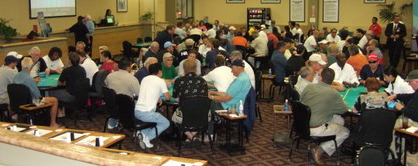Choosing the Right Table to Play At
This is part 1 of 34 in Poker and Making Money Online, a 34 Part Series.
Table selection is the most important decision you can make.

When you first walk into a poker room, you’ll see tables, lots of tables usually. At these tables, you’ll find both fish and sharks. When you’re playing poker for money, you’ll want to find the tables with the most fish and the least amount of sharks. Unless you play every day at this poker room or casino, you won’t be able to tell just by looking at them.
The same is true when deciding on a niche. When you first start building websites and working on affiliate marketing, you don’t know how to evaluate competition. You don’t know which backlinks are strongest, and which SERP’s you can overthrow. The more experience you have, the better suited you are to choose a table or pick a niche.
Take this example, you see Paul, a guy you’ve played with before at a table. He knows you, you know him. At his table are a bunch of fish that you don’t know, that are consistently losing hands and folding to bluffs. At another table are a bunch of unknowns. Which table would you prefer?
Personally, I would rather play against known competition. I know that “Paul” is my only competition. When niche marketing it’s just as important to know your competition and know which markets you can stay alive in.
In my experience, technology related fields are like sitting down at a table with Phil Ivey, Doyle Brunson and Gus Hansen. Would you sit at that table? Only for two hands to say you played with the big boys right?
Jumping into a niche like iPods, computer parts, or laptop batteries is just as bad. Those markets are flooded with superstars that, as good as you might be, you’ll always be fighting a seriously uphill battle with.
Don’t get me wrong, picking a popular niche isn’t a bad idea, you might be able to do really well in a niche like Acai Berry Supplements even though it’s flooded, but when there are so many tables full of fish, why take your chances with a shark?



Recent Comments